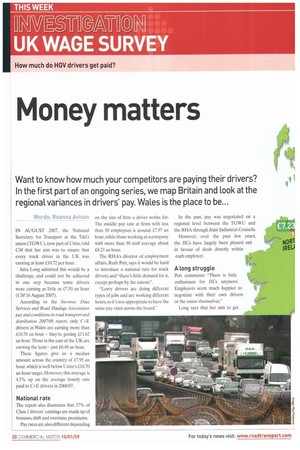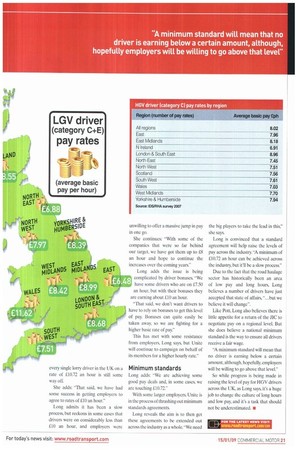Money matters
Page 20

Page 21

If you've noticed an error in this article please click here to report it so we can fix it.
Want to know how much your competitors are paying their drivers? In the first part of an ongoing series, we map Britain and look at the regional. variances in drivers pay. Wales is the place to be...
Words: Roanna Avison
IN AUGUST 2007, the National Secretary for Transport at the TS4G union (TGWU), now part of Unite, told CM that lier aim was to ensure that every truck driver in the UK was earning at least £10.72 per hour.
Julia Long admitted this would be a challenge, and could not be achieved in one step because some drivers were earning as little as £7.50 an hour (CM 16 August 2007).
According to the Incomes Data Services and Road Haulage Association pay and conditions in road transport and distribution 2007/08 report, only C+E drivers in Wales are earning more than £10.70 an hour — they're getting £11.62 an hour. Those in the east of the UK are earning the least just £6.48 an hour.
These figures give us a median amount across the country of £7.95 an hour, which is well below Unite's £10.70 an hour target. However, this average is 4.5% up on the average hourly rate paid to C+E drivers in 2006/07.
National rate
The report also illustrates that 27% of Class 1 drivers' earnings are made up of bonuses, shift and overtime premiums. Pay rates are also different depending on the size of firm a driver works for. The middle pay rate at firms with less than 50 employees is around £7.97 an hour, while those working at a company with more than 50 staff average about £8.23 an hour.
The RHA's director of employment affairs, Ruth Pott, says it would be hard to introduce a national rate for truck drivers, and "there's little demand for it, except perhaps by the unions".
"Lorry drivers are doing different types of jobs and are working different hours, so it's not appropriate to have the same pay rates across the board. In the past, pay was negotiated on a regional level between the TGWU and the RHA through Joint Industrial Councils.
However, over the past few years, the JICs have largely been phased out in favour of deals directly within each employer.
A long struggle
Pott comments: "There is little enthusiasm for JICs anymore. Employers seem much happier to negotiate with their own drivers or the union themselves."
Long says that her aim to get every single lorry driver in the UK on a rate of £10.72 an hour is still some way off She adds: "That said, we have had some success in getting employers to agree to rates of £10 an hour.
Long admits it has been a slow process, but reckons in some cases that drivers were on considerably less than £.10 an hour, and employers were unwilling to offer a massive jump in pay in one go.
She continues: "With some of the companies that were so far behind our target, we have got them up to £8 an hour and hope to continue the increases over the coming years."
Long adds the issue is being complicated by driver bonuses. "We have some drivers who are on £7.50 an hour, but with their bonuses they are earning about £10 an hour.
"That said, we don't want drivers to have to rely on bonuses to get this level of pay. Bonuses can quite easily be taken away, so we are fighting for a higher basic rate of pay."
This has met with some resistance from employers, Long says, but Unite will continue to campaign on behalf of its members for a higher hourly rate."
Minimum standards Long adds: -We are achieving some good pay deals and, in some cases, we are touching £10.72."
With some larger employers. Unite is in the process of thrashing out minimum standards agreements Long reveals the aim is to then get these agreements to be extended out across the industry as a whole. "We need the big players to take the lead in this," she says Long is convinced that a standard agreement will help raise the levels of pay across the industry. "A minimum of £10.72 an hour can be achieved across the industry, but it'll be a slow process."
Due to the fact that the road haulage sector has historically been an area of low pay and long hours, Long believes a number of drivers have just accepted that state of affairs, "...but we believe it will change".
Like Poll. Long also believes there is little appetite for a return of the JIC to negotiate pay on a regional level. But she does believe a national minimum standard is the way to ensure all drivers receive a fair wage.
"A minimum standard will mean that no driver is earning below a certain amount, although, hopefully, employers will be willing to go above that level."
So while progress is being made in raising the level of pay for HGV drivers across the UK, as Long says, it's a huge job to change the culture of long hours and low pay, and it's a task that should not be underestimated. •




















































































































































